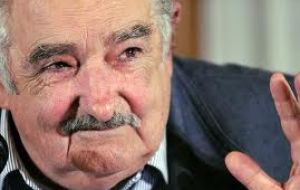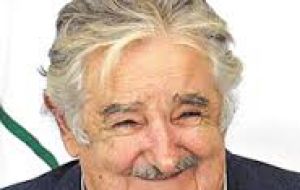MercoPress. South Atlantic News Agency
Mujica, Latin America's most original leader according to The Economist
 As president he has kept the mainly free-market economic policy, has respected media freedom and judicial independence
As president he has kept the mainly free-market economic policy, has respected media freedom and judicial independence  Mr. Mujica’s simple lifestyle and penchant for speaking his mind have turned him into a cult figure abroad.
Mr. Mujica’s simple lifestyle and penchant for speaking his mind have turned him into a cult figure abroad. Under the heading of “The sage of Montevideo”, The Economist visited the Uruguayan president at his farmhouse in the outskirts of Montevideo where they had a long chat.
The financial magazine points out Mujica's austere life style and also indicates issues overlooked by other international media dazzled by the exotic figure. In effect Mujica as a guerrilla leader ”did not fight a dictatorship. The Tupamaros bombed, kidnapped and murdered in a bid to turn democratic Uruguay into a version of Fidel Castro’s Cuba. They succeeded only in helping to precipitate a right-wing military takeover (after Mr. Mujica was jailed)“.
Likewise the urban guerrilla leader never apologized for his past efforts to subvert democracy and the rule of law, and in his study keeps a photo of Fidel Castro and a plaque of Che Guevara.
However nowadays he is a convinced democrat, ”my heart is libertarian” and, echoing Guevara, he dislikes “the exploitation of man by man”.
Follows the full article:
”Republics entered the world to affirm that men are basically equal,” declares José Mujica. Uruguay’s president abhors the red carpets, the soldiers with cornets and the “monarchical” paraphernalia that are the trappings of modern office. “If democracy means representing the majority,” he explains, “as a symbol I think that those with the highest responsibilities should live like the majority do, not the minority.”
That is what he does, almost to the point of caricature. He drives an ancient VW Beetle. He lunches in the bars on Montevideo’s main street. He commutes from his three-roomed farmhouse of grey concrete, reached down a track on a featureless plain, 20 minutes from the centre of Montevideo. Gruff but with a twinkle in his gimlet eyes, it was there that he received Bello. He was dressed in a beige fleece, brown tracksuit bottoms, leather sandals and black socks. He sat on a low stool in his study, his guests on battered chairs of formica and metal.
Uruguay, a small country wedged between Brazil and Argentina, has never been much given to ostentation. But in a world of political junketing and of bland, focus-grouped equivocation, Mr. Mujica’s simple lifestyle and penchant for speaking his mind have turned him into a cult figure abroad.
Another ingredient in the mystique is his extraordinary personal history. In the 1960s he was a leader of the Tupamaros, an urban guerrilla movement. He was wounded by six bullets when he and three comrades engaged in a firefight with police who had found them in a bar. He twice escaped from custody, only to be recaptured. Of his 14 years’ imprisonment, ten were in solitary confinement, two at the bottom of a well with only ants and rats for company.
“A lot of what came afterwards was the fruit of how much I thought, thought and rewound,” he says. “I wouldn’t have developed the political persona that I have if I hadn’t lived such tough years.” That political persona is more complex than it looks. Contrary to leftist myth, Mr. Mujica did not fight a dictatorship. The Tupamaros bombed, kidnapped and murdered in a bid to turn democratic Uruguay into a version of Fidel Castro’s Cuba. They succeeded only in helping to precipitate a right-wing military takeover (after Mr. Mujica was jailed).
It is troubling that he has never apologized for his past efforts to subvert democracy and the rule of law. In his study he keeps a photo of Mr. Castro and a plaque of Che Guevara. But most Uruguayans seem to think he suffered punishment enough for his transgressions. Asked to define his politics today, he avoids labels but says that “my heart is libertarian” and, echoing Guevara, that he dislikes “the exploitation of man by man”.
Refreshingly, Mr. Mujica bears no grudges and has no time for the politics of denuncia (denunciation) and victimhood that are the stock in trade of the Latin American left. He says he values democracy because it is a system “that doesn’t think of itself as finished or perfect” and because it promotes “peaceful coexistence” and respect for differences.
His conduct since embracing electoral politics in the Broad Front centre-left coalition is a tacit rejection of his past views. As president he has kept the mainly free-market economic policy he inherited, and has respected media freedom and judicial independence, even when the Supreme Court struck down his law to tax large farms.
His innovations have come on cultural issues. On his watch Uruguay has become the first country in South America to legalize on-demand abortion and the first in the world to do the same for marijuana. He sees those policies as being in Uruguay’s long tradition of secularism and social democracy. Rather than prohibition, its response to the temperance movement was to nationalize and regulate alcohol, for example.
Mr. Mujica’s brand of radical democracy is a welcome leftist alternative to the statism of Cuba and Venezuela, the autocracy of Ecuador’s Rafael Correa and the populism of Argentina’s Cristina Fernández de Kirchner. But he has been more effective as a symbol than as a head of government. He admits he has not done enough to reform education. The opposition complains of rising crime, over-mighty trade unions and corruption, albeit petty by regional standards.
After ten years of the Broad Front’s rule, polls suggest the presidential election in October, in which Mr. Mujica cannot run, is wide open. The peaceful alternation of power would be a backhanded tribute to the guerrilla turned popular philosopher of democracy.




Top Comments
Disclaimer & comment rules-

-

-

Read all commentsMujica has pulled the wool over the eyes of Lefties from Timbuktu to Kalamazoo .
Aug 15th, 2014 - 07:34 am 0If originality means unkempt with a vagrants appearence, then I guess he is very original.
Aug 15th, 2014 - 01:17 pm 0Once a commie is all ways a commie
Aug 15th, 2014 - 01:27 pm 0Commenting for this story is now closed.
If you have a Facebook account, become a fan and comment on our Facebook Page!